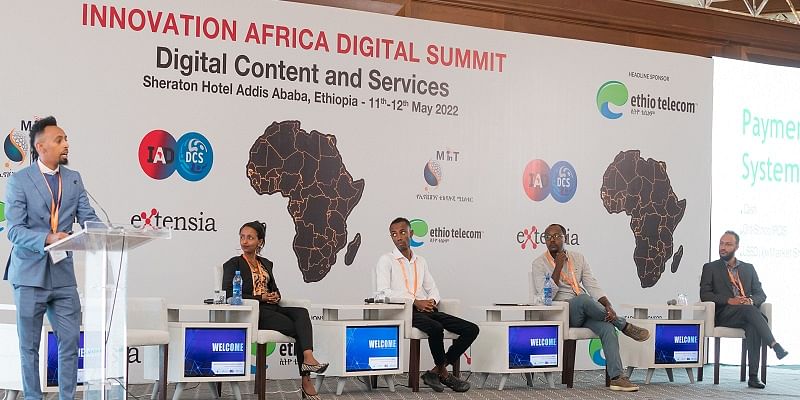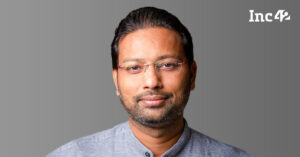Around 400 attendees from 26 countries (including 16 African countries) gathered in Addis Ababa recently for the 19th annual Innovation Africa Digital Summit (IADS) 2022. Organised by Extensia, the theme of the two-day premier conference in Ethiopia was Digital Content and Services.
As conference chair, here are my key takeaways on the main themes of this insightful flagship event. See also my earlier conference coverage of IADS in 2021, 2019, 2018, 2017, 2016, 2015, and 2014, as well as the Youth Engagement Summit.
The session topics were in three thematic clusters: connectivity (eg. 5G, rural networks), content (eg. health, education) and commerce (transactions, fintech). Case studies were presented from the B2C, B2B and e-government sectors.
Key messages include the importance of resilience and scale of digital infrastructure, particularly in the wake of the two-year pandemic which still seems active in many parts of the world.
H.E. Huria Ali, State Minister, Ministry of Innovation and Technology (MInT), Ethiopia
National agendas
The importance of cross-sector cross-border collaboration in ICT agendas was emphasised by Tariq Malik, CEO, Extensia. Advances in national communications infrastructure and regulator support of Ethiopia were showcased by Balcha Reba, Director General, Ethiopian Communications Authority, H.E. Huria Ali, State Minister, Ministry of Innovation and Technology (MInT), Ethiopia, and Dr Belete Molla Getahun, Minister, MInT.
Caroline Gaju, Programme Officer, ITU, presented research which showed that approximately 4.9 billion people (63 percent of the world’s population) were using the Internet in 2021, while in Africa, the percentage of individuals using the Internet is 33 per cent.
Gaju emphasised that neither universal connectivity with poor quality nor meaningful connectivity for the few will yield significant, society-wide benefits.
ICT infrastructure should be safe and secure, and the population needs to have access to digital skills to enable meaningful use of the internet as well. Gaju called for baselines and frameworks to be refined on a regular basis to reflect this evolution.
In Africa, the World Bank is supporting the African Union’s Digital Transformation Strategy through a flagship initiative known as the Digital Economy 4 Africa (DE4A), explained Lamia Naji, Consultant, Digital Development, World Bank.
Digital economy snapshots have been completed for 29 countries, she added. She cited research which showed that in the ICT sector, liberalisation and privatisation help make the internet more accessible and affordable.
Naji called for more collaboration for mainstreaming industry-relevant ICT curricula, and research to evaluate ICT impacts. “The onslaught of COVID-19 accelerated digitalisation and reinforced the role of G2P (government-to-person) payments in helping countries and governments deliver social assistance rapidly, effectively, and responsibly,” she observed.
Panel – HTS, Fibre and 5G
Infrastructure
Given the fast-changing digital landscape of Africa, it is important for large firms as well as SMEs to address cloud-neutral and carrier-neutral data centres, according to Anthony Voscarides, Group CEO of pan-East African data centre operator Wingu.africa.
The power of modular data centres was showcased by Tariku Demissie, CTO, Ethio Telecom. He presented benefits for businesses in terms of a wide range of metrics, such as uptime, efficiency, productivity, and security of data.
Insights gathered from data at scale and over extended periods of time can yield valuable services for businesses, government and other sectors. Technologies like AI and ML can yield predictive power as well for decision makers.
A range of other advances in ICT infrastructure for national development were presented by Tim Liu, VP, Huawei North Africa – Cloud Business Department. Solutions showcases were presented by Mobile Technologies, Intelsat, WebSprix, Cognitel and Africom Technologies.
A panel anchored by Juanita Clark, CEO, Digital Council Africa explained that 5G is not an upgrade or a replacement technology for previous generations of mobile broadband. It will most likely be rolled out as a standalone network with specific use cases.
Compelling use cases for 5G were presented by Chidi Ajuzie, COO, WTES Projects; Alvin Thomas, Senior Sales Director, Intelsat; and Dawit Birhanu, CEO, WebSprix.
Panel – Rural connectivity
While following the latest technological advances, industry stakeholders should continue their commitment to rural connectivity, as affirmed by a panel moderated by Adrian Hall, COO, Extensia. Communication options along with the potential of unleashing financial services were discussed by Pedro Rabacal, Chief Technology and IT Officer, Safaricom Ethiopia; Naoll Merdassa, VP, Sr. Solution Architect, Bank of America; and Ladi Okuneye, VP, Sub Saharan Africa, Mangata Networks.
Given the fact that large populations live in rural areas, a wide range of connectivity options, pricing, and financing plans will always need to be factored in to meet business as well as social obligations.
Effective public-private partnerships, shared infrastructure, and open access networks can augur well for a nation’s development, explained Napoleon Mengot, Strategy Manager, CSquared Group. This can unleash a $180 billion Internet economy in Africa, he added.
The tech ecosystem needs to be expanded, via infrastructure investment and pro-investment regulation. Mengot presented investment case studies from Rwanda, Senegal, Ghana and Kenya as illustrative exemplars.
CSquared has been actively working in Liberia and Togo as well, and has called for progressive regulation regarding deployment and ownership of fibre infrastructure. “Only partnerships can win,” Mengot affirmed.
Panel – Technology as a Resource
Content and services
Service providers and solution providers are collaborating to solve real world problems with technology, according to a panel moderated by Garikai Nhongo, Marketing Manager, SMART Africa. The speaker lineup included Myriam Said, Advisor, Prime Minister’s Office, Ethiopia; Bemnet Demssie, CEO, CNET Software Technologies PLC; and Naoll Merdassa, VP, Sr. Solution Architect, Bank of America.
ICTs are no longer a luxury but a necessity – not just enablers but drivers of strategy, the panel emphasised. ICTs don’t just show what is feasible, but what can be scaled up and speeded up.
While much attention understandably focuses on the B2C sector, there is also significant opportunity in enterprise and SME segments in Africa. Chris Lazarus, Chief Enterprise Business Officer, Safaricom, showed how such segmentation could be implemented across a diverse business ecosystem, with services specially tailored for local needs.
This involves an effective blend of partnerships, innovation and social impact. Tewedaj Eshetu, Head of PR and Comms, Safaricom Ethiopia, reinforced the messages of commitment, leadership and industry collaboration.
While much attention focuses on development and marketing of digital products, it is important to focus on customer engagement and retention as well. Case studies and tips in this regard were provided by Yonas Lemma, Director IT Risk & Cyber Security, Hibret Bank, and Elshadai Negash, CEO, KEMMCOM Media&Comms.
The importance of ensuring customer delight at speed and volume are effectively captured in the acronym SCALE: Strategy + Cashflow + Alliances + Leadership + Execution.
The Creator Economy
The rise of social media, digital tools and enabling infrastructure has made it easier than ever before for audiences to create a wide range of content with local and global appeal.
While it is now possible to create and access content faster, the challenge for many digital content creators is to effectively monetise this content, for which a range of enabling services firms and platforms have emerged.
Case studies were presented of increasing Wikipedia content in African languages. There are major content gaps that can be creatively filled by methods such as crowdsourcing, especially in multiple languages.
Changing frames
Over the years, the language and metaphors used to frame the ICT ecosystem has also changed, from pipes to platforms, and from information to knowledge. While some phases of the journey are referred to as sprints (eg. fast rollouts after policy clearance), others are referred to as marathons (eg. digital transformation, regulatory effectiveness).
Changes in environments can be hastened by introducing new overseas players who act like ‘icebreakers’ in increasing expectations, performance, and thought leadership on a regional and global scale.
While earlier there was lot of talk of “hope and aspirations” being unleashed by ICTs, there is now reference to the “impatience and restlessness” of stakeholders such as youth. They have been exposed to global ICT benchmarks and want similar ecosystems and enablers in their home countries as well.
Youthful entrepreneurs and other innovators are calling for not just digital skills but also skills in leadership development, an important requisite for scaling startup ecosystems. Technology is a key driver of innovation, ably reflected in the name of Ethiopia’s Ministry of Innovation and Technology (also with an apt acronym: MInT)!
Panel – Ecosystem Enablers
Startup ecosystems
Enablers like university incubators and corporate accelerators can play a key role in strengthening the startup ecosystem and improving access to smart capital, according to Girum Assefa, COO, Orbit Health; Sachiko Hara, Expert, JICA (Japanese International Cooperation Agency); and Isaac Bezabih, Digital Project Lead, Digital Opportunity Trust, Ethiopia.
Specific startup showcases were presented in areas ranging from healthcare and open content to fintech and sustainable products. Calls for more government cooperation and ease of business were made by founders such as Dr. Binyam Alemu, CEO, Blue Health Medical Consultancy; Eshetu Abebe, Co-founder and Co-CEO, Sewasew; Bethelhem Abebe, Founder and CEO, Zafree Papers; Nohe Fekade Jembere, CEO, EPhone; and Habtamu Tadessa, CEO, ArifPay.
Fireside chat – Collaboration and Cooperation
Case studies: Ethiopia, South Africa
Dr Abiyot Bayou Tehone, Lead, Digital Transformation Program at MInT, described a range of incentives in Ethiopia such as co-investment grants for digital startups as well as business incentives for digital access and training.
“Digital government has played a major role in COVID-19 response,” he emphasised. From digital payment to data protection, a range of enabling policies are being enhanced as well.
Tehone showcased research which showed that the percentage of individuals using the Internet in Ethiopia is 29.83 percent, while mobile population coverage is 97 percent. 4G services have just been rolled out as well.
Tehone charted out four categories of digital opportunity: datacentre infrastructure, BPO, e-commerce and professional services like training and consultancy. Government e-portals can increase citizen and business access to official services.
Addis Ababa – skyline
Juanita Clark, CEO, Digital Council Africa, showcased why South Africa is often regarded as a progressive environment for ICT acceleration in the continent. It leads in indicators such as FTTH/B connections and household penetration rates.
She cited research which showed that there were approximately 930 million mobile service subscriptions with 83 percent penetration rate in Sub-Saharan Africa in 2021.
South Africa had an advanced and robust submarine cable network connecting it to both coasts of Africa and beyond via seven submarine cable system with a total design capacity exceeding 70 Tbps in 2021. The number of fixed broadband connections was estimated at 3.5 million in 2021.
South Africa has a high degree of mobile tower co-location between operators as well, through barter like trades. The country ranks number 25 globally in terms of data centre density.
“Technology shift towards LTE and recent 5G deployments, and broadband service adoption fuelled by the COVID-19 pandemic, continue to drive the demand for increased backhaul capacity by the mobile network operators,” Juanita explained.
Initiatives such as infrastructure-sharing regulations, unified wayleave schemes, and rapid deployment policies are key in this regard. The Digital Council was established in 2010 under the banner of the FTTx Council Africa, as a non-profit organisation for multi-stakeholder dialogue to maximise the societal benefits of digital and data-driven technologies.
Impact
Much attention has understandably focused on business metrics of ICTs, such as customer lifetime value, marketing efficiency, and return on investment (RoI) on enterprise workflow software.
However, it is important to add two more categories of impact focus: GDP and the SDGs. More longitudinal studies are needed to show the impact of ICTs on GDP such as workforce productivity or export growth. With great opportunity comes greater responsibility, and social inclusion and environmental sustainability should be addressed as well.
Bernard Laurendeau, Managing Partner, Laurendau Associates and Matthew Harrison-Harvey, Chief External Affairs and Regulatory Officer, Safaricom Ethiopia, explained how favourable regulatory regimes can actually spur growth and ICT contributions to the GDP. Barriers to growth were identified, and ways of surmounting them through industry collaboration and nurturing the next wave of startup ecosystem players.
In the post-pandemic era, never before has so much rested on the ICT industry than now, as the digital economy continues to transform the way we work, learn and play. More such themes will be explored in Extensia’s next events this year: the C2C Summit in Tanzania and Accelerated Digital Transformation in Nigeria.








